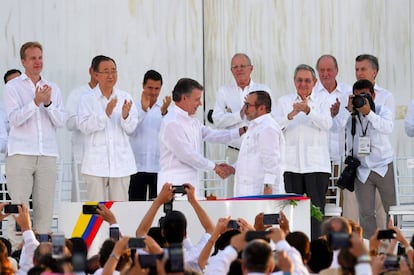Colombia hopes to turn the page on half a century of conflict
International community shows support at signing ceremony between FARC guerillas and government


Monday, September 26, 2016, will hopefully go down in Colombian history as the day when, after 52 years of conflict that left 260,000 people dead and some eight million injured and displaced, the South American country turned the page on its violent past when its president and the leader of the FARC leftist rebels signed a wide-ranging series of peace accords.
“In the name of the Revolutionary Armed Forces of Colombia I offer my apologies to all the victims of the conflict,” said FARC leader Rodrigo Londoño, better known by his nom de guerre of Timochenko, at the end of his lengthy speech to the dozen or so heads of state and foreign ministers, along with some 2,500 other guests, gathered in the Caribbean resort city of Cartagena de Indias.
“Forgiveness frees us. Forgiveness not only frees the forgiven, but above all, the person who forgives,” added Colombia’s President Juan Manuel Santos during his brief speech.
The UN Security Council voted in favor of a UN commission to oversee disarmament
The peace accords come after four years of negotiations in Havana under the auspices of the Cuban government, supported by the international community. Next, the deal has to be approved by Colombians themselves, who will vote in a referendum on October 2. “With their votes, Colombians hold an immense power: the power to save lives,” said Santos during his address.
As well as the dignitaries attending the event, among them UN Secretary General Ban Ki-moon, US Secretary of State John Kerry, Cuban President Raúl Castro, and former Spanish prime minister Felipe González, around 200 victims of the conflict from all over Colombia were also invited. Some of them spoke over the course of the day, but not as part of the signing ceremony itself, which many consider a missed opportunity.
During his lengthy speech, the FARC leader referred to Santos, a former defense minister who played a key role in overcoming the guerrillas militarily in the 1990s, as “a valuable interlocutor.” As well as referring to the struggles of the past, Londoño looked to the future role of the FARC in political life: “From now on, our only weapon will be the word: nobody should have any doubts that we will practice politics without weapons. We will keep our word: we hope the government will keep its word,” he said.
The peace accords come after four years of talks in Havana
The UN Security Council unanimously voted in favor of a UN commission overseeing the disarmament process, which under the accords has to be completed within six months.
But that is unlikely to happen unless Colombians approve the peace deal in next Sunday’s referendum.
The opinion polls suggest a majority of Colombians will vote Yes, despite a campaign aimed at discrediting the peace deal as a sell-out to the guerrillas. Leading the opposition are two former presidents, Andrés Pastrana and Álvaro Uribe, who attended a protest in Cartagena shortly before the signing ceremony attended by some 2,000 people.
Pastrana and Uribe’s call to the international community to boycott the event was largely ignored. That said, the Colombian government was disappointed that Spain sent only its foreign minister and former monarch Juan Carlos to the signing ceremony, according to diplomatic sources.
English version by Nick Lyne.
Tu suscripción se está usando en otro dispositivo
¿Quieres añadir otro usuario a tu suscripción?
Si continúas leyendo en este dispositivo, no se podrá leer en el otro.
FlechaTu suscripción se está usando en otro dispositivo y solo puedes acceder a EL PAÍS desde un dispositivo a la vez.
Si quieres compartir tu cuenta, cambia tu suscripción a la modalidad Premium, así podrás añadir otro usuario. Cada uno accederá con su propia cuenta de email, lo que os permitirá personalizar vuestra experiencia en EL PAÍS.
¿Tienes una suscripción de empresa? Accede aquí para contratar más cuentas.
En el caso de no saber quién está usando tu cuenta, te recomendamos cambiar tu contraseña aquí.
Si decides continuar compartiendo tu cuenta, este mensaje se mostrará en tu dispositivo y en el de la otra persona que está usando tu cuenta de forma indefinida, afectando a tu experiencia de lectura. Puedes consultar aquí los términos y condiciones de la suscripción digital.








































